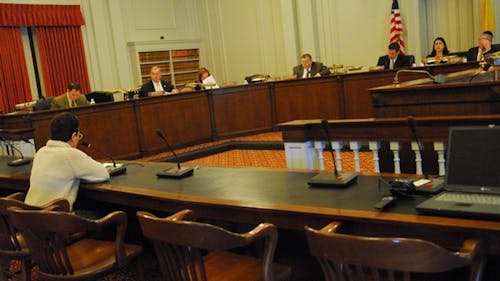Public testifies for funds at state budget hearing

TRENTON — Economic crisis, smart allocations and budgets — they seem to be the only topics on the table of public discourse recently and consumed conversation at yesterday's State Assembly Budget Committee hearing.
In a town hall style, the hearing gave those involved in public safety, economic development, transportation, environment, arts, history and cultural issues a chance to advocate for increased funds in the state budget of the fiscal year 2010.
With a list of more than 50 testifiers, the hearing went all day as the committee interviewed and considered each presentation.
"This is a national crisis. It is a world wide economic collapse, and New Jersey is not immune," said Chairman Louis D. Greenwald, D-6. "The budgets across the country from state houses to your houses are being shaped by a national economic crisis unseen since the Great Depression."
A budget hearing on Higher Educational Services is scheduled for April 28 at 2 p.m. in the State House Annex in Trenton.
The state budget is allocated between state aid, grants, capital, debt service, operations and employee benefits.
The current recession — predicted to last until the fiscal year 2011 — will see at least a $426 billion deficit, he said.
"Dire times call for dire measures," said Bonita C. Grant, University librarian and New Jersey bibliographer. "It may be time to consider targeted, temporary tax increases on those who can most afford it."
Grant testified on behalf of the New Historical Commission, the New Jersey State Council on the Arts, the New Jersey Cultural Trust and the Division of Travel and Tourism.
"These key agencies … finance grants, special projects, educational programs, promotional initiatives, publications and exhibits for diverse individuals and organizations," she said. "Attendance is up dramatically at libraries, performances, museums and historic sites as people seek free or inexpensive events close to home."
Grant asked for no grants, but for funding levels from the hotel and motel tax to be retained.
"In hard times like these, the legislature giveth and the legislature taketh away. They want to divert funds [from the hotel and motel tax] for other things," she said. "Everything is important. The women with children who have [developmental] disabilities are important. But [the legislature] have got to find new funding sources."
Members and mothers of Autism New Jersey told the committee that although funding is supposedly allocated to support services for adults with developmental disabilities and autism in particular, reality sees no trace of the funds.
"Parents say that when winter break is over, they can see the deterioration of their child's routine and progress. We [as parents] have worked hard, our kids even harder than any one else," said Erica Lofgren, mother of a 21-year-old diagnosed with autism since the age of two.
School districts are responsible for services to autistic students until they turn 21. At that time, the students graduate and continue to receive support services from state funds.
But because very little funding goes to these services, many families are left to their own solutions.
New Jersey has extremely long waiting lists for adults with autism who are looking to move out of their parents' home and live on their own with support. Families are then forced to move out of state or continue to support their child.
Greenwald promised to investigate and consider the serious lack of funding for adults with autism in the state.



